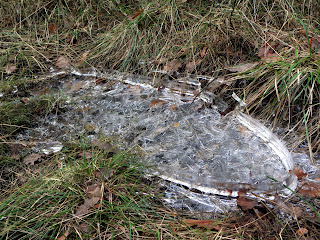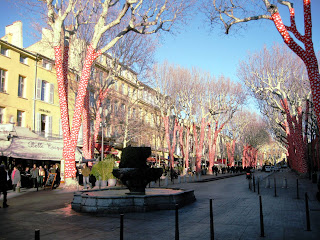No really . . . he was talking about the absolute nothingness before the beginning of the universe, as part of
Think Week in Oxford! The talk was so popular that people had to be turned away from the door. This event was held in a teaching room in the famous
Ashmolean Museum.
Atkins is of course a popular speaker and people expect to get good value from any talk that he gives and he did not disappoint. This time he included a number of his usual (witty and pithy) atheistic comments but he was aiming to explain a possible view of the origin of the universe to a bewildered audience.
The point of the talk was to demonstrate that the creation of the universe from absolute nothingness might be open to scientific elucidation, contrary to the view that religion offers the only answers. As he said, unlike religions, when different branches of science intermingle there is support rather than conflict. He also re-stated his assertion (which I find very reasonable) that the '
why' questions should really be rephrased as portmanteaus of '
how' questions that science can answer. When theologians claim that science can't answer the
why questions, his reply is to shrug and say "
So what? There is no valid question beginning with 'why'". By asking
how questions, we get rid of the need for omnipotent beings, and the supernatural has no place in science.
He went on to show some different models of families of universes, and mention that our notion of time might be far too naive. Time
might be circular but for today he wanted to assume that there really was an instant in time when the first universe came into being. Following similar lines to Lawrence Krauss in his book
A Universe from Nothing, Atkins went on to explain how the universe might look as though it is full of energy but in fact the positive energy, including that which exists as matter, is exactly balanced by the negative energy associated with gravitational attraction. When questioned about why gravitational energy is negative he used a nice analogy that I had never heard before. Take two objects. One distorts space-time to make a gravitational well, and the other rolls into the well to reach a lower energy state. I like it!
Getting gradually deeper into the science of origins and carefully pointing out that he was not telling us that this is the answer, but only a possible answer, he went on to talk about conservation laws. Taking as his first example, the law of conservation of energy might be inferred from the observation that the universe has no net energy. If it came from nothing then the simplest explanation is that 'the nothing' had no energy, and that state has been preserved. He invoked Noether's (first) theorem which states that any differentiable symmetry of the action of a physical system has a corresponding conservation law. In the case of the conservation of energy, the associated symmetry is the uniformity of time. Similarly, conservation of momentum is associated with the uniformity of space, and angular momentum with the isotropy of space. In fact almost all laws of physics probably imply the uniformity of the '
nothing' that was there before the universe, and he gave some examples of how the alternative to the physical laws would lead to virtual anarchy.
Concluding the first part of the talk he pointed out that at the creation almost nothing happened. There is still nothing here, but it is a much more interesting form of nothing than it was before nothing happened.
The second part of the talk became much more abstract, getting into set theory and some other mathematics and without admitting where I lost the plot I'm not going to describe it in detail. Someone was recording it, and if it is published on the web I will link to it so that you can listen for yourself. My short summary of it is that time may be regarded as a dimension, but that it is a very special kind of dimension. The idea that there is only
one dimension of time (when there are three spatial dimensions) implies that you can't turn around in it.
(Eeek! How?)
He then concluded that the whole point of his talk was to show us that science is not afraid to confront the concept of
nothing at all, and that the properties of nothing at all can be discussed quite rationally.
In the Q&A there was a question about how (a) god (the creator) might not have been god at all, but that aliens might have seeded the Earth with life and having realised that it was all going wrong had gone away leaving no sign of their involvement. Having tried to answer the question politely, the questioner persisted with a little rant about how he wasn't being taken seriously. He refused to stop even when asked by the chairman.
In his typical politely assertive way Atkins answered that if there was any evidence at all for that idea then it would definitely be worth considering, but that there isn't any evidence. The questioner picked up his coat and left, much to the relief of all of us.
All in all, it was an entertaining evening with a great speaker and a great chance to meet some very interesting people, older friends and newer. I will be attending more Think Week events, (although unfortunately not all of them).















